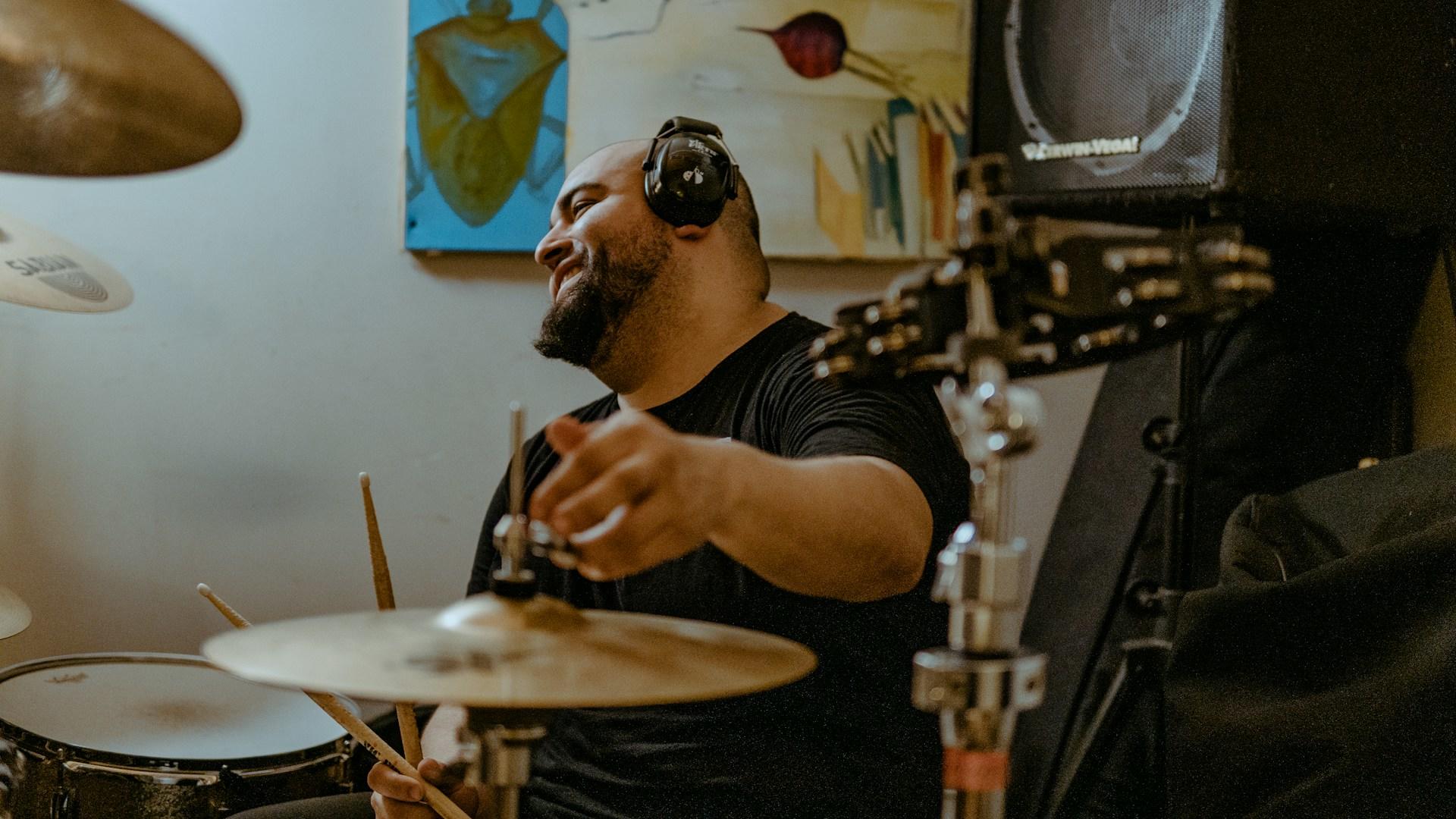The tambourine may be a simple instrument, but this percussion instrument can bring real life to a performance: in an ensemble, in some parts of traditional and folk music, and even in the odd classical piece, the presence of tambourines can be felt and heard! Not everybody realizes but the tambourine comes in many variations, from the pandeiro to the timbrel and has flourished all around the world, in many different cultures and places. We’re going to use this article to tell you about this underrated instrument and how to play it.

What Is a Tambourine?
Now, for all those that are wondering, what is a tambourine precisely? A tambourine is a percussion instrument that has a frame in which can be found zills, pairs of metal jingles that strike each other as you move the instrument. Usually, across this frame is a stretch of drumhead or a drum skin, a thin plastic membrane that resonates when you strike it.

This, essentially, is the tambourine. However, it has its variations: some tambourines do not have the drum head, for example, so that the only thing that you can strike is the frame. This is important, actually. Because whilst one gives a fuller percussive effect, the other provides only the rhythm of the zills struck indirectly.
You’d find a tambourine in a few different places. Drummers, or the band percussionist, may well have a tambourine on his or her drumkit – alongside the snare, the cymbals, and the bass drum. Meanwhile, these instruments are probably more commonly hand-held – and shaken or struck with the hand or a beater.
Learn how to play the marimba here on Superprof!
A Brief History of the Tambourine
As we said, there are a huge number of cultures across the world that have a variant on the tambourine. From the buben in Eastern Europe to the riq in the Arab world, from the Indian ganjira to the Indonesian rebana. The tambourine is not just something whacked lazily by the lead singer every so often; it rather spreads across the whole length of the world.

The tambourine appears to originate in the Near East, in ancient Egypt and Mesopotamia, where it was used in rituals by performers. And whilst, from there, it spread through ancient Greece and Rome into Europe where, by the Middle Ages, it was common, it also popped up all across the world too.
The instrument took its name ‘tambourine’ from the French who took it in turn from the Persian word for ‘drum’. All in all, it is quite an important instrument – and it still remains crucial to traditional music from southern Europe in particular, such as in the Italian tarantella.
I was actually … in the 1990s nobody played tambourine.
Joel Gion, from The Brian Jonestown Massacre, recalling the tambourine’s resurgence in rock music
How to Play the Tambourine: Is the Tambourine Easy to Play?
Now, learning how to play a tambourine might seem like it’s easy, but the tambourine shouldn’t be underestimated. It’s not quite as simple as whack and shake – particularly if you are after some more interesting rhythmic effects.
Of course, though, if you are just going for the simplest ways to play, slapping it against your thigh would do, or else striking the frame with the palm of your hand.
To play a handheld tambourine properly, the process is incredibly simple.
- Hold it in your non-dominant hand
- Strike it against that hand, or shake it in the air
- Experiment with different angles, which can give a greater vibration or different sound
That's really it. If you want more interesting sounds, however, you can try the roll and the thumb roll.
The roll produces a drum roll sound, and it is created by rotating the wrist quickly. However, you can combine this with a strike too. The thumb roll creates a quieter roll; it is a bit like playing the snare drum with brushes. Move the thumb over the surface of the skin or the frame and the zills will jingle nicely.
For beginners, it’s helpful to start with simple patterns that match a steady beat. A common technique is to shake the tambourine on the downbeat while tapping the frame with your palm on the offbeat, which helps develop timing and coordination. Another easy method is alternating between striking the tambourine against your thigh and clapping it with your hand. This creates a natural back-and-forth rhythm that feels intuitive for most players!
When it comes to songs, tambourine fits perfectly into folk, gospel, and pop music. Beginners often start by playing along with slower songs that have a clear, steady beat, such as “This Little Light of Mine” or “Blowin’ in the Wind” by Bob Dylan. As confidence grows, you can try adding tambourine to livelier tracks like “Hey Mr. Tambourine Man” by The Byrds or “Brown Eyed Girl” by Van Morrison, where the tambourine naturally enhances the groove. Even a simple eighth-note shake or a well-placed strike on the chorus can bring these songs to life!
Most people can pick up the basics such as holding, shaking and striking in time within just a couple of hours. With a week or two of practice, you will be able to keep steady rhythm and play along with simple songs. More advanced techniques like the thumb roll or shake roll usually take a few months to master, but the tambourine is quick to learn and rewarding to improve over time. After 6 months you can start playing in a band!

Are There Different Types of Tambourine?
As the tambourine is an instrument that is present all over the world, there are an infinite variety of these musical instruments. And we can’t possibly discuss them all here.
However, we can give you a sample of some of the types of tambourines that are available in stores near you. If you head to a music shop – or to a store specializing in drums – you will still find alongside the drum sets, the snare drums and maracas, a range of different tambourines. They can be compared to playing the triangle as this is one of the few handheld musical instruments and is a simple option that doesn't have multiple notes (or limbs) for players to worry about.

As well as different types of tambourine, there are models available with different numbers of "zills" which are the tiny mounted symbols. There's no single best tambourine type, but they both provide very different options.
Single Zill
A more subtle sound and focus on hitting the skin rather than the rattling of the small symbols
Double Zill
A much more cymbal-style sound, and more of a sleighbell feel to the overall tone. Louder, too!
Let’s take a look at some of the types of tambourine:
Headless Tambourine
The ‘headless’ tambourine is a variation on this hand drum that doesn’t have the skin head. Rather, it will just have the jingle frame and a place where to put your hand. Without the skin, these don’t necessarily need to be struck. Rather, they produce sound merely through their own vibration. So, shake them or strike the frame to the rhythm.
Whilst you're here, check out our article on different types of percussion instruments which shows more about the tambourine's overall influence.
Half-Moon Tambourine
The half-moon tambourine is a type of headless tambourine. However, where tambourines are traditionally circular, on the half-moon the handle is inverted so that it sits inside the circle of the instrument. The benefit of this is that it gives you greater agility, so that it is easier to play faster rhythms. Here's how to play on a half-moon tambourine!
Mounted Tambourine
The mounted, or mountable tambourine, is the type that is used by drummers on their drum kit. These can be mounted onto a drum stand and played with drumsticks.

This is convenient for percussionists who want to intersperse their rhythms with the tambourine’s sound.
Hi-Hat Tambourine
This is a form of headless tambourine that sits on top of the hi-hat in a drum set and changes the sound whenever the drummer uses the hi-hat pedal, so it stays in the rhythm of the hi-hat in a song but can give a different dimension to the sound. Here's a beat on YouTube to get you in rhythm!
Playing the Tambourine: Where Have You Heard the Tambourine Played?
We said that the tambourine is pretty much ubiquitous across the world. However, we also said that it is not entirely certain that you would have noticed the tambourine playing unless you were looking out for it. A bit like the xylophone, the references aren't so popular, but they are out there – you can also learn how to play the xylophone on Superprof.
The Tambourine in Rock and Pop
Let’s start with the tambourine in popular music. Tambourine playing is often popular among singers, and it gives them something to do with their hands while they're singing away at the front!
Prince – Tamborine
Prince was awesome. Throughout this appropriately numbed track, ‘Tamborine’, the rhythm section is absolutely on fire. It’s one of very few tracks in which the tambourine is absolutely unmissable and takes center stage in some ways (including being the name of the track).
Velvet Underground – I’ll Be Your Mirror
On their debut album, the Velvet Underground mixed gorgeous song writing with innovative musical soundscapes. But if we’re talking about the tambourine exclusively, ‘I’ll Be Your Mirror’ rocks it. The hand tambourine playing is crucial to the song.
The Monkees – Daydream Believer
This might be one of the most famous instances of a tambourine sound being used, and you can even see its use in the video!
Where to Find a Percussion Teacher Who Can Teach You Tambourine
If you want to get out of the tambourine all that it can give you, you may want to get in touch with a percussion teacher. They’ll be able to show you some more advanced techniques and help you to incorporate the tambourine into more sophisticated percussion playing. One of the best places to find a percussion teacher is with Superprof, the platform that connects students with tutors quickly and conveniently.
Just search in your area for percussion teachers or find one that is available for online lessons. Many drum tutors provide tuition in the tambourine and other handheld percussive instruments, and students can take lessons at a convenient time for them. The majority of our tutors offer the first hour free – so that you know exactly what you are getting. Reach out to a tambourine or percussion tutor on Superprof today.
Have you heard of the steel hang? Check out how to play it in our article, Playing the Steel Hang.
Summarize with AI:
















I can sing and play the piano (separately) but am about to use the tambourine for the first time with my choir, and found your article very informative and helpful. So thank you very much for taking the trouble to help newbies